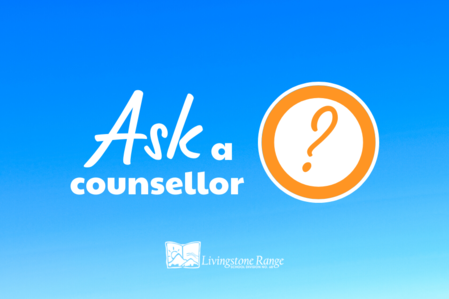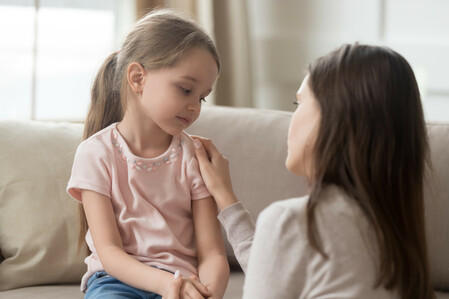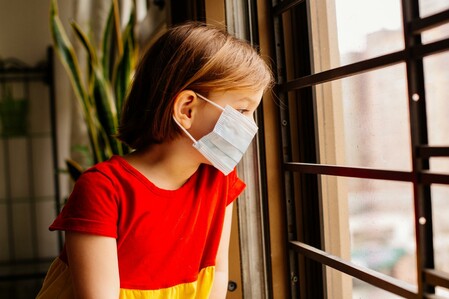Ask a Counsellor
Family School Liaison Counsellors are here to answer your questions about mental health and wellness during the COVID-19 pandemic.

My child seems a bit blue; what I can do to help her? Is it normal for my son to be sleeping more than usual? As a student, I don't want anything to do with online learning; can I just quit this year of school?
Email stewarth@lrsd.ab.ca with your mental health questions. A counsellor will reply to you within a week. Answers that will benefit other families and students will be shared here without any identifying information.
For urgent mental health situations, please call the Alberta Mental Health Help Line at 1-877-303-2642 or in case of emergency, call 911.
Q: I’m not a teacher. How am I supposed to support my children with their learning from home when I’m also dealing with everything else going on? School on top of everything else is too much - this is very overwhelming.

You’re absolutely right! There is a lot of life going on right now: a lot of uncertainty, a lot of questions about what is going to happen and how we are going to get through it all. As parents and caregivers, the primary concern to be addressed right now is building safety among our families and within our homes. This must be our first priority.
With regard to academics, simply do the best you can. This will look different for each person, and this may also vary on a day by day basis. Some days without question will be harder than others. Try to stick to a routine as routines also help to build safety, but remember to be flexible within these routines, our needs are high right now, our bodies and brains are stressed, and when we are stressed we are unable to learn to the best of our capacities. Teachers are available to help: email them, phone them with your questions, relay your concerns and your struggles with this new format of learning. Definitely ask for help, and don’t be afraid to tell them if it’s not working for your situation – they want to help and they want to support, so please reach out.
The important piece I can’t stress enough is spending time with your family, sharing in activities and experiences that bring you joy, comfort, safety, and yes, security. Support one another, build stronger bonds, and know that you are there for each other and not in this alone. COVID-19 is a global pandemic, but how it impacts each family and each individual will be very different and unique to that family/individual. We will get through this, and as a school system, we will be here to help our students to catch-up and move forward.
Q: I’m really noticing my child’s mental health is beginning to suffer as a result of schools being closed, the unknowns of this situation, and the isolation due to social distancing. How can I help?

It’s so true, our kids are struggling right now. Just like us, our kids are dealing with their own grief over all of their recent losses - loss of routine, loss of school, loss of freedom of movement, social connections, future plans and experiences, and so much more. This is a very isolating, confusing, and stressful time for us and for our families, and these stressors do impact our mental health and well-being, but there are many things we can do to help during these uncertain times.
How you can help:
Be Present. Of utmost importance in times like these is building a sense of security and safety within your family system. Encourage family time. Connecting with your children in fun and interactive ways and bringing experiences of joy and laughter into your daily living practices. This is quality time and so important for maintaining meaningful connections.
Validate Feelings. Take time each day to encourage conversations with your children. Ask them how they’re managing and what they’re feeling; validate their responses. They may be feeling worried, angry, frustrated, sad, disappointed… listening, with the intent to understand, empathize, and validate helps to create a sense of safety and security within our relationships and helps to encourage greater opportunities for family bonding.
Establish Routines. Try to establish daily routines (sleep, eat, school, play, etc.) and follow them to the best of everyone’s ability, while still remaining flexible enough to meet the needs of our loved ones as they may arise. People typically manage better when they know what to expect and what is expected of them. Maintaining (flexible) consistency and structure will help create calm during times of uncertainty and stress.
Make time for movement. Movement is key; our bodies and brains are connected. Movement reduces our feelings of anxiety, depression, and stress and improves our sense of self-esteem and accomplishment. Getting up and getting outside provides the opportunity to physically move, while getting fresh air and a good dose of nature – a natural brain booster.
Encourage Virtual Social Interaction. We all do and feel better when we feel like we are connected to those whom we care most about. Find a way for your child to connect with friends and loved ones – it’s important. This may mean becoming more flexible with expectations around digital devices. That’s okay. Connections matter and help to alleviate our sense of isolation.
And finally,
Be kind to yourself. Try not to put too much stress upon yourself or others to be perfect. Simply do the best you can. Treat yourself with compassion and understanding. When we are worried about the ones we love, never be afraid to ask for help. These are unprecedented times with many unknowns, but we will get through this.
Q: I feel like I am on a rollercoaster of emotions. I am either irritable or I feel foggy and disconnected. What is happening and what can I do?

First of all, everything you are feeling is very normal. Our bodies and brains are designed to manage dangerous and stressful events (like being in a pandemic) by fighting against it, running away, or by freezing until the danger goes away. In today's pandemic, we cannot run away because there really is no where we can go. We are supposed to stay home so that takes that option away from us. Our only other two options are then to fight or to freeze. With fighting, we may feel angry, irritable, frustrated, and annoyed. With freezing, we may feel foggy, disconnected, numb, tired, distracted, and unfocused. It may feel impossible to get tasks done.
What can we do if we are feeling this way?
Be patient with ourselves
What we are feeling is normal. Just recognize it for what it is and move onto the next step.
Set a Routine
Having a schedule for your family will actually lower your stress level for your whole family. Your children are used to having a routine during the day. Teachers tend to be very structured. Work with your children to set a routine that works for your family. Just remember there may be times you need to be flexible.
Self-Care
The best way to manage all of these emotions is to make some time to take care of yourself. It may be very difficult to find some time for yourself right now. However, if you want to change these feelings, then it really is going to be important you make self-care a priority. Real self-care, not the 5 minutes before you fall into bed type of self-care.
What needs to happen is that you need to build self-care into your daily schedule. Taking a break is the best way to get yourself back to feeling calmer and more likely yourself. The great thing about putting time for self-care into your daily routine is that you will model how to take care of yourself to your family. This will really help to reduce the overall stress in your family.
Q: Getting my child to do their school work is always a fight. They are not doing as well as they used to with their academics and are not motivated despite all my efforts. How can I get my child motivated to keep up with their school work without a fight

It is super normal for students to be losing motivation to do their schoolwork right now. Most of them haven’t seen their friends or favorite teachers in months now. They are struggling to stay in touch and enjoy each day. The days are getting warmer and the outdoors are calling.
It is hard for you to see this as a parent and equally as hard for you to try to make them do their school work. It is exhausting to be dealing with the strangeness of this pandemic and the inability to reach out to your regular supports, friends, family, and community and it is hard.
This is all okay. This is all normal and you are not alone in these struggles.
If your child has suddenly lost the motivation to do their schoolwork, they may need a check-in with their school counselor or another mental health professional as they may have hit a mental health wall and need some guidance getting out of it. They may just be tired and need a break.
If your child has always struggled with motivation and is still struggling or even more so, they may need some academic guidance from teachers for another approach to their learning or help in understanding the material.
The most important thing you can do right now is to nurture the relationship between you and your child. Academics are important, but one of the more positive things that can come of this whole pandemic is the relationships we build and maintain with our loved ones. Your child knowing that you care about your relationship and that you want to be there for them, may help them to open up and share with you their feelings and anything else that might be going on.
Give yourself and give your child a break. Let yourselves have the day or week off and start fresh later. Reach out to your student’s teachers, admin, and school counselor to get some help and support. Their teachers want to help, they just need to know that there is something going on. Just know that your relationship needs to come before academics, this will help build resilience in your home and you can move forward with goals from there. You can do this, have faith in your own and your child’s abilities, and above all, be kind and patient with yourself, you are being asked to do more than is normal.
Q: I hate that my child has to be on screens and devices a lot more now. They seem to be on their computers and phones all the time. How can I balance this?

Everyone is definitely using their devices, internet and social media more than ever these days. For a lot of us, this is our only communication with the outside world, family and friends. This is how we stay informed and connected.
While they still need it in their life, it is important to make sure that your children are being safe while online. Make sure they are on safe and age-appropriate social media platforms as several can involve strangers reaching out to them and photos being distributed. There are trends that are not safe and can result in emotional, social, and relational damage. Keep the conversation open about why your child should not engage in this type of behavior and how they can stay safe. Online bullying is still occurring and something to ask your child about and monitor. This website is a wonderful resource https://www.internetmatters.org/ for parents and children.
Make sure you and your children spend time outdoors every day, especially with the weather getting warmer, this can help balance out a foggy brain that has been looking at a screen for long periods of time. Your child still needs nutritional meals and a good night’s rest, so try to monitor that devices and screen time aren’t interfering with this. Children also benefit from reading and quiet time alone without any screens, this is a good and sometimes difficult habit that gets easier the more you do it. This could start with 10 minutes and work all the way up to 30 or 60 minutes a day, whatever works for you and your family.
Limit online and screen time between specific hours or within specific time frames. Teach your children how to use the internet for fun and positive things. (Click here for a great list of resources.) Participating in Zumba or Yoga are things that can keep them moving while using the TV and internet.
This is definitely a tricky thing to manage right now with our kids being limited to what they can do and who they can see, but whenever you can, send them outside or stick them in the bath to pass the time.
Q: My son has become more anxious and clingy especially at bed time, and sometimes it seems to take him a lot longer to actually get to sleep. The doctor has ruled out any medical issues. What can I do?

Some children go through times on and off where they struggle with sleep. This can be part of normal development as they are understanding themselves as being separate from their caregivers, or as they become more aware of the outside world and start to worry about things, real or not real (burglars, ghosts etc.) that may want to harm their home or the people in their home. Sometimes growth pains can keep them awake. And sometimes when they sense worry or stress in the people and systems around them, this can affect their sleep as well.
What I've often suggested to other families, is to investigate, with the child if possible, what seems to be contributing to making sleep harder, and what helps them to have better sleep. I also ask them to consider 'experimenting' with different strategies that have helped other children. The things we wonder about:
- is your son getting plenty of exercise/body movement throughout the day
- is he eating well (e.g. not too much caffeinated pop drinks or sugar)
- ends use of screen-time a few hours before bed time
- the bedroom is at a temperature or weight/warmth of blankets that are helpful to him to sleep well (some children prefer heavy blankets; others need it to be cool)
- does he prefer a night light or all dark?
- is it quiet enough?
Then ask about any worries that may be present throughout the day, or that may pop up especially at night time. Even for adults, often our stresses and worries seem biggest during the evenings or middle of the night. Allow your child time and your non-judgemental focus to hear what these worries may be, no matter how 'silly' they may seem to an adult. Sometimes children despite loving and patient parents calming their fears, still ruminate. Ask if he is ready to experiment. Some ideas I've shared with other families:
- Create a worry jar/box. Allow him to choose the container and perhaps decorate it. Have a pen and slips of paper near it. Throughout the day or evening, he can write the worries on slips of paper and put them in the jar. (If he is too young, simply be the secretary and write them down without discussing). Then designate a short period of time once or twice a day that you pull them out and discuss. Time for say 10 minutes.
- Be very selective what kind of show or game he watches in the evenings. Ensure it is positive or funny.
- Have him create his own joke or find a joke, and tell it to family members (in the home, or perhaps even on the phone to a relative etc.) before bedtime.
- Have him read (or listen to) a funny or uplifting story while in bed.
- He could have colouring pages (something he finds calming) in his room to do before bed.
- Sleep to music, nature sounds, or a calm/positive story on tape (to over-power worried thoughts).
- During the day and especially in the evening, attempt breathing exercises together: breathing in positive energy, happiness, love, joy ... then breathing out stress or worry.
- Teach him to lay in bed and do a progressive muscle relaxation: tighten various parts of the body and then relax them ... doing each part one at a time.
- Teach him to do visualization (practice during the day, so it's accessible at night time): visualize a place, real or imagined, that gives feelings of calmness or joy. Or remember a funny event. (The brain can't hold ruminating worries at the same time as deeply imagining the beach or the puppy stealing Dad's socks.)
- Do math backwards in his mind while laying in bed, e.g. count backwards by twos, then threes.
If he is worried about you or other loved ones being in an accident or dying, assure him that it is normal for children and even adults to worry about this for the people they love. Mention the circle of all those around him that would care for him even in the slim chance if something were to happen. If you have a spiritual practice such as prayer or meditation, utilize this in terms of handing over worries to a higher power. Discuss how worry is there to protect us, but worry can also grow too large and steal hours of sleep or fun from us if we don't contain it; and that's why it's important to try all these different experiments and sleep hygiene.
As adults, we also need to ensure we are intentional about our own worries and stresses, and how this may be 'leaking out' to our children, causing them to mirror our negative feelings. It may mean being careful not to verbalize these worries within our child's hearing (reserving that talk for other adults). It may mean taking much more time for our own self-care so that we can exhibit a sense of calm, patience and kindness in our home. This will have a ripple effect on our children. We can't promise that nothing will ever happen to us or them financially, or physically etc., but we can be measured in our verbal and emotional responses so children have the best chance at being calm and having faith that they are secure and will be loved and looked after, despite the concerns going on in the world around them.
Q: I think my teenage daughter is feeling anxious and highly stressed as she is making comments about how fat she feels, and when we sit down for meals, she tells us she is not hungry. I am worried that she is dieting and depriving herself of food.

We live in a society that promotes being thin as a goal. Teens feel pressure for body perfection. They believe that if they are thin, they will be happier and more popular. Magazine and television ads use the technique of photo-shopping to create “perfect” images, and social media sends messages that teens aren’t good enough. Added to these unrealistic body images are the external messages about “good foods” versus “bad foods”, so no wonder teens are tempted to go on diets and “conform”.
In times of extra stress, teens are searching for something they can control in their life as control gives them a sense of empowerment. Thus, they may decide to restrict and/or go on a diet. But as most of us know, dieting can cause more stress and feelings of failure. It actually reinforces body negativity, rather than promoting body positivity. The danger is that it doesn’t take long for a very unhealthy relationship with food to develop. What is really scary is that young kids who diet have an increased chance of developing an eating disorder.
What approach can a parent take? Encourage your teen to deal with his/her stress in other ways (such as expressive art, moderate exercise, outdoor play, journaling, projects, etc). Have a non-judgemental conversation about what nutrition actually means; it is all about foods that nourish and give energy to the body and mind, help us grow, and be strong and healthy. Here are some statements that also can be helpful:
- I believe that my body is very wise and that I can depend on it to tell me how to eat.
- This is my body, and I have a right to decide what foods I put in it.
- I am not going to buy into the belief that everyone should look one way, and I am not going to diet to try to change my body.
- If I listen to all the messages about good and bad foods, I end up feeling bad about myself if I don’t choose the “good” foods. I don’t want to feel that way anymore.
If your teen continues to struggle, an appointment with a counsellor, a nutritionist, and/or a pediatrician can be helpful. Elyse Resch has wonderful insights in her book, “The Intuitive Eating Workbook for Teens” She suggests a non-diet, body-positive approach to building a healthy relationship with food.
Q: I hear a lot about depression in the time of COVID. How do I know if somebody needs help?

By now everyone knows that livings with the COVID19 virus is challenging in many ways. Some of us struggle with doing work or school work online and are missing the daily interaction with teachers and peers. Lots of people feel cut off from their community of family and friends in order to keep people who are more vulnerable safe. We hear from medical people that the new way of living is causing an increase in mental health problems. One of the common problems is depression.
You may find yourself asking, “Am I depressed? Is my child depressed? How do I know and when is it time to get help?” You can start by trying to help the person with positive routines such as regular sleeping, eating, and exercise. ‘Being there’ for listening and conversation is important even if the problem can’t be solved.
It is good to have conversations with our family members or friends about how they are doing. Ask simple questions like ‘How are you handling things today?’ or ‘What is frustrating for you?’. Sometimes it helps to just make an observation that the person seems down like, ‘Hey you seem really down, what’s going on?’. It is normal to feel down and frustrated at times, however, it is not normal to be feeling down and depressed all day, and for many days in a row. If that is what is happening, it is time to get help.
Pay attention to any significant changes that are concerning. For example, some of the changes could include:
- Sleep troubles (having trouble sleeping, having trouble staying asleep at night or sleeping excessively)
- Becoming withdrawn and not interacting with the people around them
- Big mood swings
- Increased irritability or unusual behaviour
- Losing interest in activities that used to be important to them
- Eating problems (losing appetite or eating excessively)
- Feeling helpless and hopeless about things improving
If you are feeling like the changes are significant and different from what a person’s typical behavior is, it is time to talk to a Mental Health Resource person or make a trip to a family physician where an assessment for depression can be done.
It is especially important that if the person you are concerned about is having any thoughts of suicide (even fleeting thoughts) to get medical help immediately. If you are concerned about imminent harm, take the person to the emergency room at a local hospital.
We know that the pandemic has been hard on people and their mental and emotional health, but you do not have to do this alone, help is available. Do your best to focus on healthy routines. Be sure to take advantage of natural supports like friends, parents, or someone you trust. Take the opportunity to be outside and to connect with other people through safe social practices. Make sure you are getting some exercise and eating well. We will get through this challenging time.
For helpful mental health resources click here.
Q: Usually we are excited for the end of school but not this year. We are confused about what the end of the year will look like and how to help my child wrap up their learning and say goodbye to their teachers and classmates. What should I do?

You are not alone in this time of closure. This has been an unusual time for all students, staff and communities. Teachers remain accessible by email, phone or whatever method you have established with them over the last months so continue to access your child’s emails or the school website with your child present so they feel part of the process. Listen to their concerns and reach out. Our Family School Liaison Counsellors are also available at every school to bounce concerns/ideas off of.
As far as an end of year routine which usually included all kinds of fun activities to celebrate their accomplishments and say their goodbyes - think outside the box and let your creative side show with your child. Ever thought of making a video for a teacher or friend and sharing your gratitude? Putting a sign on your lawn to celebrate “We got through this school year together as a family".
Always remember to give yourself recognition for becoming a juggler for all the roles that you have fulfilled. You all deserve a GOLD STAR!
Q: Despite guidelines loosening my child does not seem to want to re-engage. They seem to be afraid to leave the house or see other people. They become upset when I try to force the issue. What is going on? What do I do?

What is going on:
To get a thorough assessment you can contact your local Alberta Mental Health office to speak with a therapist. This is a free service, and the therapist can help to determine what is going on for your child.
A likely explanation is anxiety. The Covid-19 pandemic has been anxiety-provoking. This is a natural, normal response. However, at times the anxiety response outlives its purpose or is more intense than is needed to safely navigate a situation.
Your child may be afraid of catching or spreading Covid-19. Or possibly they are experiencing social anxiety. With the break in school, and regular social activities re-engaging with others may feel daunting, and scary. Alternatively, they may have an increased sense of general anxiousness and be unable to articulate a specific fear or worry. They may be choosing to stay home to avoid these uncomfortable feelings.
This response will focus on anxiety; however, it is also possible that the issue is not anxiety. Depression, addiction, or just extreme introversion are a few of many other possible explanations. Please see a qualified therapist if you are unsure.
What you can do:
1) Inform yourself and your child
In an age-appropriate way talk to your child about why we socially distanced and why we can progressively open up now (for example: We gave health care a chance to better prepare for and understand Covid-19. Our government now believes our health system is prepared if the virus spreads further. People will be monitoring the situation to ensure our safety).
Learn about and help your child understand what anxiety is. Anxiety is a normal, necessary human response. Anxiety helps to motivate and protect us. However, at times anxiety can be more intense or long-lasting than necessary. Anxiety itself is not harmful, it is okay and healthy to allow yourself to feel it, it will pass. However, you can learn to manage anxiety to increase your comfort and decrease anxiety's effect on your life.
2) Teach your child relaxation strategies:
- Deep breathing (4 seconds in, hold for 4, out for 4).
- 5 senses grounding - describe 5 things you can see, 4 things you can physically feel, 3 things you can hear, 2 things you can smell, 1 thing you can taste.
- Progressive muscle relaxation.
3) Manage thoughts
Help your child learn to challenge extreme/exaggerated thoughts:
- Is there another way of thinking about this?
- How likely is that outcome?
- Will this matter in a month? A year?
- What could go well?
Practice mindfulness – notice thoughts come and go, bringing focus back to the present moment.
4) Exposure
Progressively expose your child to the outside environment again. Think of this as a ladder where you start with little steps that cause only mild anxiety, moving up the ladder as they are ready.
For example, their ladder may be:
- walking around your block together
- walking past the park
- walking through the park
- playing at the park for 5 mins during a non-busy time
- playing at the park for 30 mins non-busy time
- playing at the park 5 mins during a busier time
- playing at the park 15 mins during a busier time
This process would continue until they are able to fully engage to their previous extent. The idea is to slowly increase their area of comfort. Pushing to hard to fast could have the opposite effect.
For more information on anxiety, any of these approaches, and more, check out www.anxietycanada.ca
A therapist can also help you with this process. If you're unsure how to access a qualified therapist, call your local Mental Health office.





















